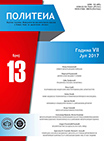International political communication and influence of information and communication technologies on contemporary international relations
Abstract
International political communication can be seen as an auxiliary but also constitutive discipline of the International relations in the wider field of the Political science. At the very core of International relations is Political communication through which the most important actors of world politics realize political goals. This paper presents a short genesis of the development of the International political communication and relation to the International relations. The key terms have been defined, the most important theories have been given and today's global character of International communication has been highlighted. The changes in International politics were analyzed as the consequence of the information and communication revolution and the emergence of modern Information and communication technologies that change the very nature of International relations. An overview of the new communication technologies impact on the main actors (subjects/entities) of International relations was made, thus analyzing the impact of this factor on both state and non-state actors. We looked back at the impact of information and communication technologies on an individual who, thanks to the global communications network, became a real actor of world politics. There is also a section of the main theories of International relations and their relation to the challenges brought by the Informatics revolution (IT revolution) and the Digital age.
References
Steel, C, Stein, A. (2002). “Communications Revolutions and International Relations” in. Allison, J.E. (ed.): Technology, Development and Democracy - International Conflict and Cooperation in the Information Age, Albany: State University of New York Press.
Smith, A. (2003). “Towards a global culture?”, in. McGrew, A., Held, D. (ed). The Global Transformaions Reader - An introduction to the Globalization Debate (2.ed), Cambridge: Polity Press.
Gilpin, R. (2003). “The Nation- State in the Global Economy”, in.McGrew, A., Held, D. (ed). The Global Transformaions Reader - An introduction to the Globalization Debate (2.ed), Cambridge: Polity Press.
Frank, A.G. (1998). ReOrient: Global Economy in the Asian Age. Berkeley, CA: University of California Press.
Littlejohn, S. W. & Foss, K. A. (2009). Encyclopedia of Communication Theory, Thousand Oaks, California: Sage Publications.
Mann, M. (2003). “Has Globalization Ended the Rise and Rise of the Nation-State”, in. McGrew, A., Held, D. (ed). The Global Transformaions Reader - An introduction to the Globalization Debate (2.ed), Cambridge: Polity Press.
Norris, P., Inglehart, R. (2009).: Cosmopolitan Communications - Cultural Diversity in a Globalized World. Cambridge: Cambridge University Press.
Radojković, M., Stojković, B., Vranješ, A. (2015). Međunarodno komuniciranje u informacionom društvu. Beograd: Clio.
Naj, Dž. (2006). Kako razumeti međunarodne sukobe. Beograd: Stubovi kulture
Vukadinović R. (2004). Međunarodni politički odnosi. Zagreb: Politička kultura.
Nye, J.S., Jr (2004a). Soft Power: The Means to Success in World Politics. New York: Public Affairs.
Baylis, J. & Smith, S, (2001). The Globalization of World Politics, Oxford, Oxford University Press
Autori koji objavljuju u ovom časopisu pristaju na sljedeće uslove:
- Autori zadržavaju autorska prava i pružaju časopisu pravo prvog objavljivanja rada i licenciraju ga "Creative Commons Attribution licencom" koja omogućava drugima da dijele rad, uz uslov navođenja autorstva i izvornog objavljivanja u ovom časopisu.
- Autori mogu izraditi zasebne, ugovorne aranžmane za neekskluzivnu distribuciju članka objavljenog u časopisu (npr. postavljanje u institucionalni repozitorijum ili objavljivanje u knjizi), uz navođenje da je članak izvorno objavljen u ovom časopisu.
- Autorima je dozvoljeno i podstiču se da postave objavljeni članak onlajn (npr. u institucionalni repozitorijum ili na svoju internet stranicu) prije ili tokom postupka prijave rukopisa, s obzirom da takav postupak može voditi produktivnoj razmjeni ideja i ranijoj i većoj citiranosti objavljenog članka (Vidi Efekti otvorenog pristupa).

